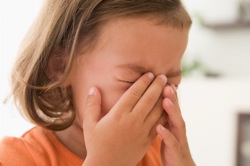
Your gluten-free third-grader walks in the door and immediately bursts into tears. Someone brought cupcakes to celebrate a birthday at school and everyone got one but her. "No one will want to be my friend because I can't eat gluten," she says between sobs.
If you follow a gluten-free diet to manage your Hashimoto’s hypothyroidism, chances are you have discovered your child has an intolerance to gluten or other foods as well. An autoimmune diet tends to become a family affair.
However, moments of childhood angst can test the strongest resolve. Fortunately, you're in growing company. Eight percent of children have food allergies, a figure that has risen 20 percent in the last 10 years. Many children today also have celiac disease or gluten intolerance, which tends to run in the family.
Some children must be on a special diet, such as the GAPS or ketogenic diet, that eliminates all sugar, grains, processed foods, and other staples of the American diet. While the health reasons for the diet may be obvious, a child's emotional reaction can muddy the waters. Children may feel left out, angry, anxious, sad, or embarrassed, which can distress parents.
The solution? Model the attitude you wish to see in your child. Self-confidence, calmness, and a positive attitude are the approaches recommended by child psychologists.
The real experts, of course, are moms raising children with food allergies or intolerances. For many moms, learning how to manage their Hashimoto’s hypothyroidism through diet has led to better diets for their children.
What follows are some of their tips.
What to do when your child feels left out due to food intolerances
- Validate. If your child feels the diet is unfair, or if she is sad, angry, or embarrassed, repeat back to her what she says and commiserate.
- Educate. Help your child make the connection between the offending food and the reaction. For some children, it's easy because the reaction is swift and severe. For others, the reaction is delayed or not as clear, such as bedwetting, anxiety, or a rash that appears several days later. Education can help your child to see the consequences for himself.
- Praise. One mom whose daughter must be on a ketogenic (low-carb, high-fat) diet to control seizures frequently tells her daughter how she proud she is of her for following a diet most adults couldn't.
- Treat. Making snacks for your child to bring to birthday parties and social gatherings is a fact of life. One mom buoyed the situation her child faced by making food that looked better than what the other children had.
- Model. If you suffer from a Hashimoto’s hypothyroidism, another autoimmune disease, obesity, or some other chronic health disorder, use yourself as an example of the consequences of poor dietary choices, and demonstrate how you can work your way back to good health eating the same diet as your child.
- Offer perspective. Most everyone struggles with something that makes them feel different. For some, it's a food intolerance. For others, it may be asthma, behavioral issues, or another struggle your child doesn't have. Perspective can help your child feel less different.
Hardships and the occasional meltdowns aside, managing food intolerances can teach children how their diet affects their health and how to better care for themselves, lessons that will serve them well as they become more independent in their teens.
And for children of a parent with Hashimoto’s hypothyroidism, an immune-friendly diet can help prevent the development of Hashimoto’s or another autoimmune disease.





Latest from the Blog
Breaking Through Cancer Barriers: News Outlets Spotlight High-Dose Vitamin C Therapy
December 5, 2024https://www.yahoo.com/news/pancreatic-cancer-patient-survival-doubled-152722177.html Harnessing the Power of High-Dose Vitamin C in Cancer Treatment Recent advances in cancer treatment research have brought renewed attention to high-dose intravenous (IV) vitamin C, particularly in extending survival rates for patients with advanced different forms of cancer. A groundbreaking phase 2 clinical trial Study Finds demonstrated that combining high-dose IV vitamin C […] Read more
Latest from the Blog
The Dirty Dozen
The “Dirty Dozen” is a list of fruits and vegetables, compiled by the Environmental Working Group (EWG), that you should always eat organically. These produce items are not only delicious and nutrient-rich but also tend to carry high levels of pesticide residues when grown conventionally. By opting for organic versions, you can significantly reduce your […] Read more